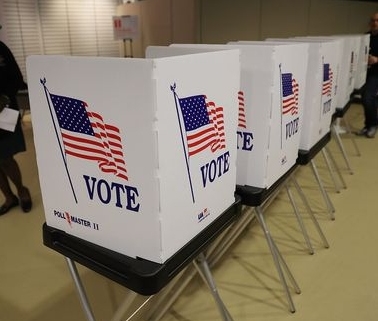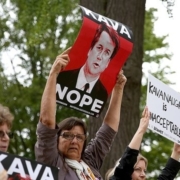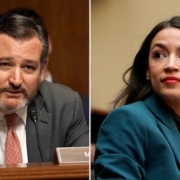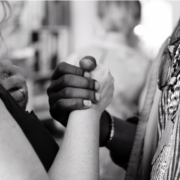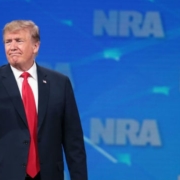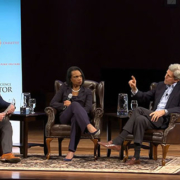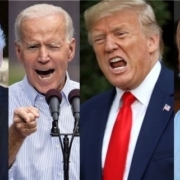“If you want to fix the polarization crisis, use your vote to shift the political climate”
Common Ground Committee co-founder, Bruce Bond, shared his thoughts on how and why we should vote for common ground this election in an op-ed for USA TODAY.
As you research candidates before heading to the polls, look for those with a track record that demonstrates a bias toward making progress on issues, not destroying the other side.
If you want to fix the polarization crisis, use your vote to shift the political climate
Polarization has reached a tipping point. To fix it, start by voting for candidates with a record of bipartisanship, regardless of their party.
The spate of suspicious packages and pipe bombs targeting prominent Democrats and the recent hate crimes have been horrifying. As someone who works full-time on mitigating the increasing polarization that divides our nation, I see intense disagreement every day. This was something else entirely — heartbreaking, appalling and shocking. These attacks and an increase in incendiary rhetoric have further exposed the festering divisions in our country. But they also spurred a bipartisan call for civility.
Sen. Jeff Flake, R-AZ, expressed how we need to “tone down the rhetoric. Both sides. We’ve got to see people as opponents, not enemies.” Senate Democratic leader Chuck Schumer tweeted a statement saying, “Despicable acts of violence and harassment are being carried out by radicals across the political spectrum — not just by one side. Regardless of who is responsible, these acts are wrong and must be condemned by Democrats and Republicans alike. Period.”
On Tuesday, I will join Americans in voting for members of both chambers of Congress. In 36 states, my New York included, we are voting for governors as well. Only 38 percent of Americans say the United States is heading in the right direction, and an annual poll tracking discourse shows 93 percent say America has a civility problem. It is evident. The divisive, angry tone of our public discourse is increasingly dangerous and too often perpetuated by those we elect to public office.
Vote for those who will find common ground
Your vote has the power to reverse the deepening abyss of destructive politics if you divert from voting along ideological lines and choose candidates who prioritize making progress on key issues over attacking the opposition. Cast a ballot for those who are not only capable of finding common ground but who also seek opportunities to repeatedly reach across the aisle.
If we don’t vote common ground before party, the pernicious effects of incivility following the midterm elections will only intensify.
To be sure, I am not advocating voting for “nice” people. The best leaders never compromise their fundamental principles. But our country needs leaders who are aware that their default approach needs to be finding common ground, not solely standing their ground. When they do dig their feet in on an issue, good leaders attribute their firm stance to their principles, not flaws in their opponent’s character.
As you research candidates before heading to the polls, look for those with a track record that demonstrates a bias toward making progress on issues, not destroying the other side. Utilize the Lugar Center’s Bipartisan Index and the Allegheny College’s Prize for Civility in Public Life to learn more about politicians known for working civilly with their opponents to find common ground. Ask candidates to describe how they work with members of other parties to move forward on issues you care about — whether that is health care, guns or immigration — then cast your ballot for those you believe will work across party lines to solve those problems. In other words, vote common ground.
Use your vote to shift our political climate from destructive to constructive. Vote for candidates who understand that impactful and long-lasting solutions come only from a wealth of input from voices who bring different experiences and views to the table. Today, our politics are rooted in the mindset that the other’s perspective is, at best, a “check the box” consideration. This approach is unproductive. Just look at how the Senate voted along party lines for the Affordable Care Act and the Tax Cuts and Jobs Act. The minority party vowed to significantly change or repeal these bills once they resumed power. In the case of ACA, they did just that.
We need leaders in office who will stand tall on the two or three issues that matter most to them and their constituents yet prioritize working with others with differing views, not to check a box but because it is necessary to bring lasting change.
Historically, politicians have worked across party lines. President Bill Clinton and House Speaker Newt Gingrich found common ground on welfare reform. Sens. John McCain and Russ Feingold joined forces in regulating the financing of political campaigns. Though harder to find, it’s happening today, too.
A Democratic gubernatorial candidate in South Dakota chose a Republican as a running mate. Ohio politicians reached across party lines to create the Congressional Civility Caucus so Congress can reach results, not fight. Politicians like Donna Brazile, Michael Steele, John Sununu, and Barney Frank took part in public forums hosted by the Common Ground Committee, an organization I co-founded that inspires action on polarizing issues by bringing prominent leaders with opposing views together to find common ground.
We can still fix polarization
We are not past the point of no return. According to a recent study on polarization, 77 percent of Americans say the differences between us are not so big that we cannot come together. Regardless of your political affiliation, it is crucial to your vote. Vote and help others vote common ground as well.
In a recent heated election, rather than vote for ideology, I decided to vote for the candidate who earned my respect for the strength of character, and in previous positions, demonstrated an ability to work with opponents. Fighting along ideological lines has buried us deep in this political quagmire. Let’s wield the power of our democracy and use our vote to move in a new direction, one that puts the country’s need for common ground and progress before ideology and party.
— This article was published in USA TODAY on November 5, 2018

